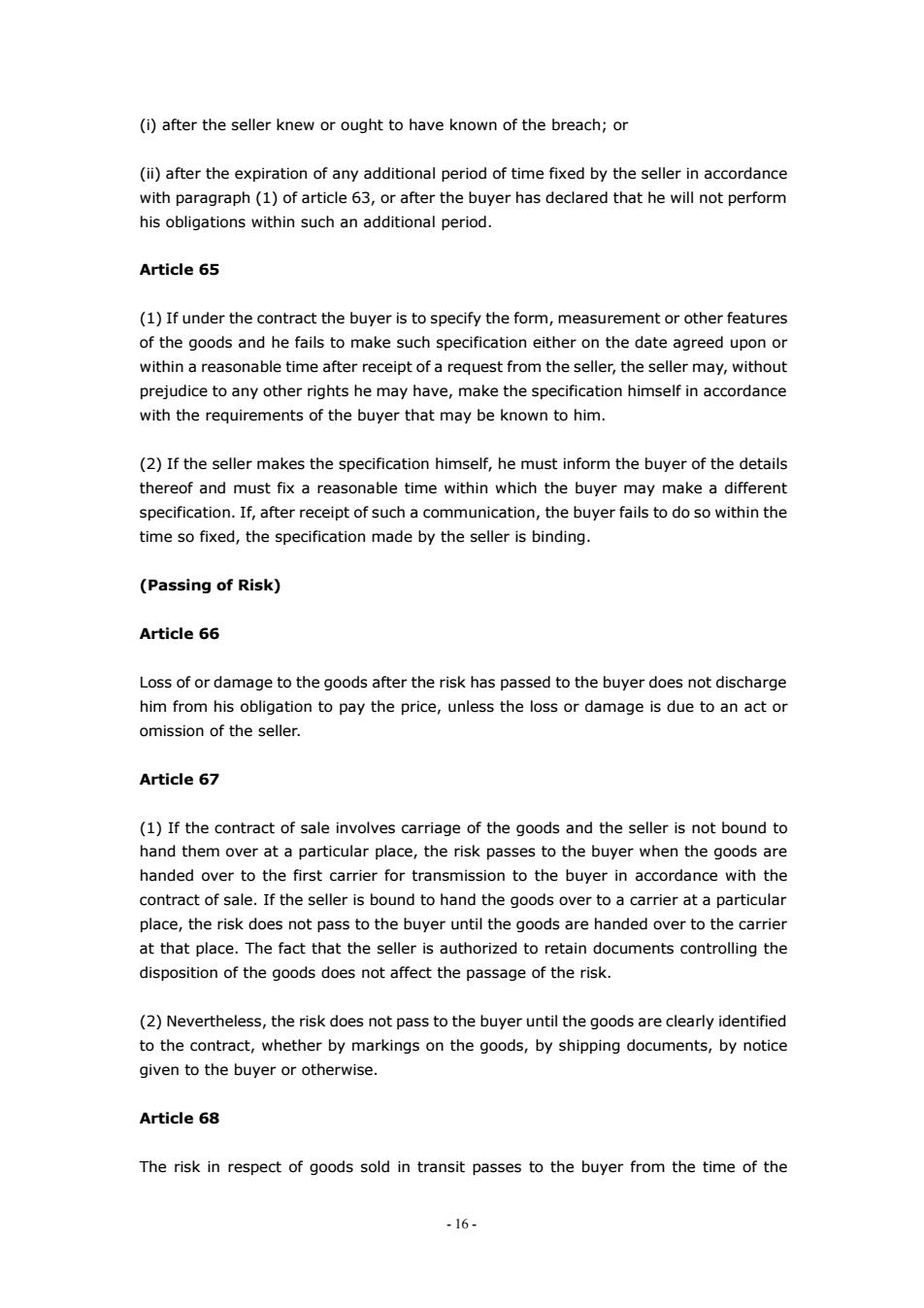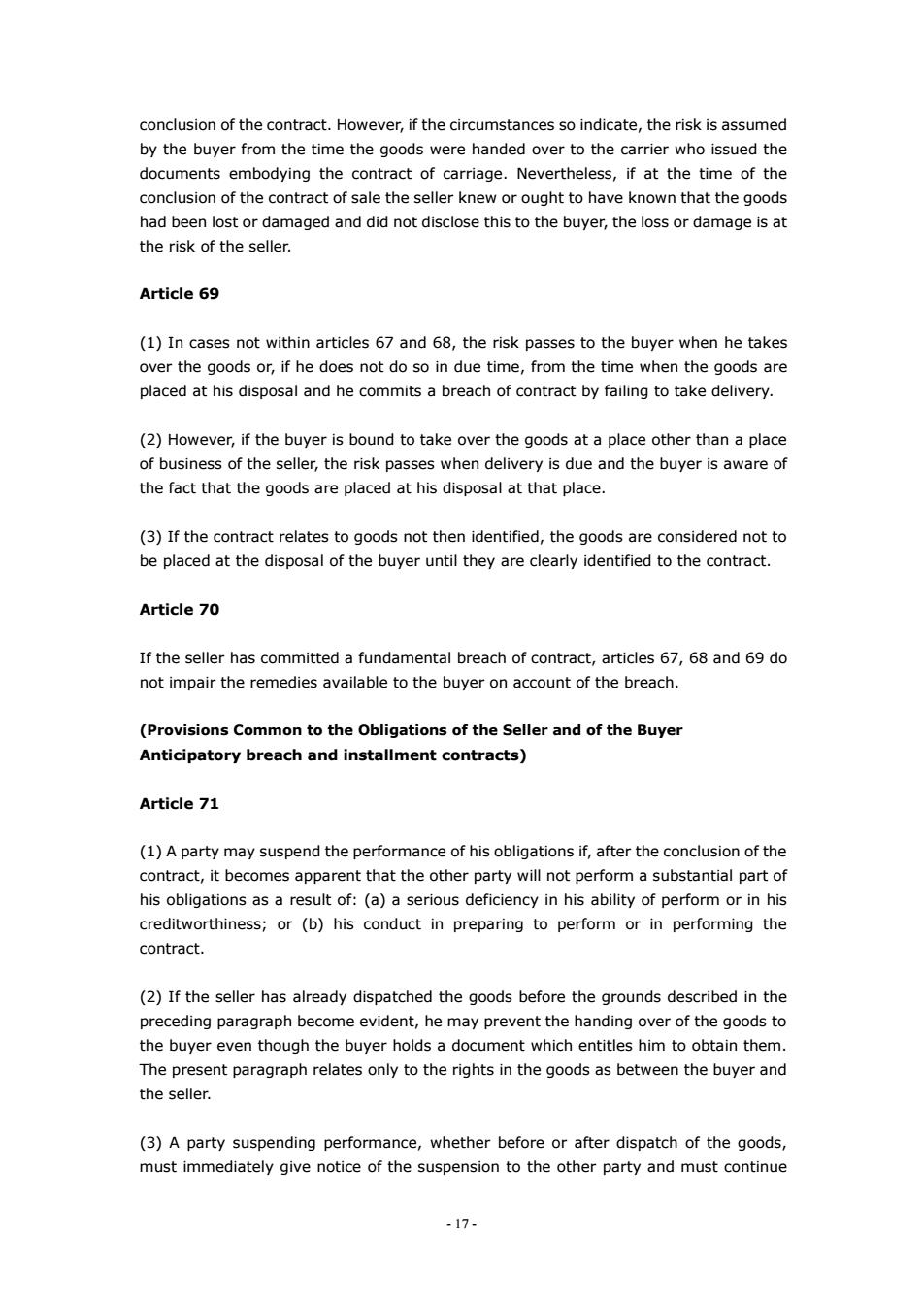
(i)after the seller knew or ought to have known of the breach;or (ii)after the expiration of any additional period of time fixed by the seller in accordance with paragraph(1)of article 63,or after the buyer has declared that he will not perform his obligations within such an additional period. Article 65 (1)If under the contract the buyer is to specify the form,measurement or other features of the goods and he fails to make such specification either on the date agreed upon or within a reasonable time after receipt of a request from the seller,the seller may,without prejudice to any other rights he may have,make the specification himself in accordance with the requirements of the buyer that may be known to him. (2)If the seller makes the specification himself,he must inform the buyer of the details thereof and must fix a reasonable time within which the buyer may make a different specification.If,after receipt of such a communication,the buyer fails to do so within the time so fixed,the specification made by the seller is binding. (Passing of Risk) Article 66 Loss of or damage to the goods after the risk has passed to the buyer does not discharge him from his obligation to pay the price,unless the loss or damage is due to an act or omission of the seller. Article 67 (1)If the contract of sale involves carriage of the goods and the seller is not bound to hand them over at a particular place,the risk passes to the buyer when the goods are handed over to the first carrier for transmission to the buyer in accordance with the contract of sale.If the seller is bound to hand the goods over to a carrier at a particular place,the risk does not pass to the buyer until the goods are handed over to the carrier at that place.The fact that the seller is authorized to retain documents controlling the disposition of the goods does not affect the passage of the risk. (2)Nevertheless,the risk does not pass to the buyer until the goods are clearly identified to the contract,whether by markings on the goods,by shipping documents,by notice given to the buyer or otherwise. Article 68 The risk in respect of goods sold in transit passes to the buyer from the time of the -16-
- 16 - (i) after the seller knew or ought to have known of the breach; or (ii) after the expiration of any additional period of time fixed by the seller in accordance with paragraph (1) of article 63, or after the buyer has declared that he will not perform his obligations within such an additional period. Article 65 (1) If under the contract the buyer is to specify the form, measurement or other features of the goods and he fails to make such specification either on the date agreed upon or within a reasonable time after receipt of a request from the seller, the seller may, without prejudice to any other rights he may have, make the specification himself in accordance with the requirements of the buyer that may be known to him. (2) If the seller makes the specification himself, he must inform the buyer of the details thereof and must fix a reasonable time within which the buyer may make a different specification. If, after receipt of such a communication, the buyer fails to do so within the time so fixed, the specification made by the seller is binding. (Passing of Risk) Article 66 Loss of or damage to the goods after the risk has passed to the buyer does not discharge him from his obligation to pay the price, unless the loss or damage is due to an act or omission of the seller. Article 67 (1) If the contract of sale involves carriage of the goods and the seller is not bound to hand them over at a particular place, the risk passes to the buyer when the goods are handed over to the first carrier for transmission to the buyer in accordance with the contract of sale. If the seller is bound to hand the goods over to a carrier at a particular place, the risk does not pass to the buyer until the goods are handed over to the carrier at that place. The fact that the seller is authorized to retain documents controlling the disposition of the goods does not affect the passage of the risk. (2) Nevertheless, the risk does not pass to the buyer until the goods are clearly identified to the contract, whether by markings on the goods, by shipping documents, by notice given to the buyer or otherwise. Article 68 The risk in respect of goods sold in transit passes to the buyer from the time of the

conclusion of the contract.However,if the circumstances so indicate,the risk is assumed by the buyer from the time the goods were handed over to the carrier who issued the documents embodying the contract of carriage.Nevertheless,if at the time of the conclusion of the contract of sale the seller knew or ought to have known that the goods had been lost or damaged and did not disclose this to the buyer,the loss or damage is at the risk of the seller. Article 69 (1)In cases not within articles 67 and 68,the risk passes to the buyer when he takes over the goods or,if he does not do so in due time,from the time when the goods are placed at his disposal and he commits a breach of contract by failing to take delivery. (2)However,if the buyer is bound to take over the goods at a place other than a place of business of the seller,the risk passes when delivery is due and the buyer is aware of the fact that the goods are placed at his disposal at that place. (3)If the contract relates to goods not then identified,the goods are considered not to be placed at the disposal of the buyer until they are clearly identified to the contract. Article 70 If the seller has committed a fundamental breach of contract,articles 67,68 and 69 do not impair the remedies available to the buyer on account of the breach. (Provisions Common to the Obligations of the Seller and of the Buyer Anticipatory breach and installment contracts) Article 71 (1)A party may suspend the performance of his obligations if,after the conclusion of the contract,it becomes apparent that the other party will not perform a substantial part of his obligations as a result of:(a)a serious deficiency in his ability of perform or in his creditworthiness;or (b)his conduct in preparing to perform or in performing the contract. (2)If the seller has already dispatched the goods before the grounds described in the preceding paragraph become evident,he may prevent the handing over of the goods to the buyer even though the buyer holds a document which entitles him to obtain them. The present paragraph relates only to the rights in the goods as between the buyer and the seller. (3)A party suspending performance,whether before or after dispatch of the goods, must immediately give notice of the suspension to the other party and must continue -17-
- 17 - conclusion of the contract. However, if the circumstances so indicate, the risk is assumed by the buyer from the time the goods were handed over to the carrier who issued the documents embodying the contract of carriage. Nevertheless, if at the time of the conclusion of the contract of sale the seller knew or ought to have known that the goods had been lost or damaged and did not disclose this to the buyer, the loss or damage is at the risk of the seller. Article 69 (1) In cases not within articles 67 and 68, the risk passes to the buyer when he takes over the goods or, if he does not do so in due time, from the time when the goods are placed at his disposal and he commits a breach of contract by failing to take delivery. (2) However, if the buyer is bound to take over the goods at a place other than a place of business of the seller, the risk passes when delivery is due and the buyer is aware of the fact that the goods are placed at his disposal at that place. (3) If the contract relates to goods not then identified, the goods are considered not to be placed at the disposal of the buyer until they are clearly identified to the contract. Article 70 If the seller has committed a fundamental breach of contract, articles 67, 68 and 69 do not impair the remedies available to the buyer on account of the breach. (Provisions Common to the Obligations of the Seller and of the Buyer Anticipatory breach and installment contracts) Article 71 (1) A party may suspend the performance of his obligations if, after the conclusion of the contract, it becomes apparent that the other party will not perform a substantial part of his obligations as a result of: (a) a serious deficiency in his ability of perform or in his creditworthiness; or (b) his conduct in preparing to perform or in performing the contract. (2) If the seller has already dispatched the goods before the grounds described in the preceding paragraph become evident, he may prevent the handing over of the goods to the buyer even though the buyer holds a document which entitles him to obtain them. The present paragraph relates only to the rights in the goods as between the buyer and the seller. (3) A party suspending performance, whether before or after dispatch of the goods, must immediately give notice of the suspension to the other party and must continue